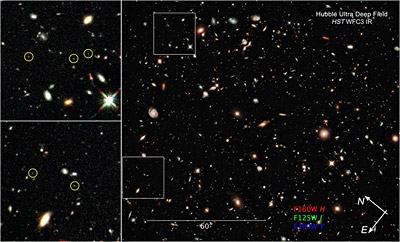Spinoza winner Marijn Franx to use successor to Hubble
A permanent exhibition on the place of humans in the cosmos. This is something Franx wants to use his Spinoza Prize for. ‘So much progress has been made that we are still trying to define the questions. In finding the answers we are constantly coming up against surprises.’
How do galaxies change?
Marijn Franx is involved in the ‘archaeology of the cosmos’. He studies the most distant galaxies. The light from these galaxies takes so long to reach us that it shows what these galaxies looked like at a much younger age. Franx’s research studies how galaxies and the universe change in the course of time. The light from the farthest galaxies has taken 13 billion years to reach the earth, so that astronomers are seeing galaxies from the time when the universe was less than 1 billion years old.
New distance record

Franx and his research group discovered that there are already old galaxies in the young universe. These galaxies for some reason formed no new stars; there was a kind of cosmic birth control. Moreover, it appears that these galaxies are dramatically heavier even though they are smaller than the galaxies of today. This can only be explained if the galaxies swallowed one another during collisions. Last year the team broke a new distance record with the updated Hubble Space Telescope.
Successor to the Hubble
In the coming years Franx will be processing new data from the updated Hubble, and will use the Spinoza Prize to access the successor to the Hubble, the
James Webb Space Telescope. This new telescope has been built by NASA and ESA and is to be launched on an ESA rocket. Franx explains: ‘These new telescopes give us a previously unimaginable view of the universe. So much progress is being made that we are still busy defining the questions. The answers we find amaze us time and again.’
Permanent exhibition and smart phones
Franx also wants to use the subsidy to share scientific knowledge of nature with a broader public: ‘My aim is to develop applications for I-phones and other smart phones that will be able to show the marvels of the natural world in an attractive way. To stimulate creativity we will kick off with a competition: ‘ Think up an (I-) phone application for science. I also want to set up a permanent exhibition on the place of man in the cosmos, and modern astronomy.’
Marijn Franx
Franx graduated in Leiden in 1984 with honours in astronomy. Four years later he obtained his PhD, also with honours, in Leiden. Between 1988 and 1993 he worked at Harvard as a Junior Fellow, and as a Hubble Fellow. From 1993 to 1998 he was a professor in Groningen and since 1998 he has held a professorship in Leiden. The last few years have been exceptional for Franx. His research group has obtained many excellent results with the Hubble Space Telescope, and with 8-metre telescopes on the earth’s surface. The members of his team have received both prestigious prizes and jobs.
Four astronomy winners
This is the second time that a Leiden astronomer has won the Spinoza Prize. The first Leiden winner was Professor Ewine van Dishoeck Professor Ed Van den Heuvel (UvA), and Professor Michiel van der Klis (UvA) are also past winners of this prestigious prize.
Three Leiden laureates in 2010
This year apart from Franx, two other Leiden scientists have been awarded the Spinoza Prize: Naomi Ellemers, Professor of Social Psychology of Organisations, and Ineke Sluiter, Professor of Greek Language and Literature. Utrecht chemist Piet Gros has also been awarded a Spinoza Prize.
Research
(7 juni 2010-NOVA/Sterrewacht Leiden/HP)
